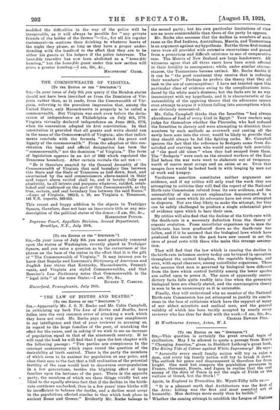" THE LAW OF BIRTHS AND DEATHS."
(To THE EDITOR or THE " SPECTATOR.") SIR,—Apparently Mr. J. S. N. Roche and Mr. Colin Campbell, in criticizing my book The Law of Births and Deaths, have fallen into the very common error of attacking a work which they have not read. Mr. Roche pays a very poor compliment to my intelligence and that of your reviewer in accusing us, in regard to the large families of the poor, of mistaking the effect for the cause, and in asking if we wish to see an increase of population equal to that of the nineteenth century. If he will read the book he will find that I open the last chapter with the following passage : "Two parties are conspicuous in the constant controversy which rages round the question of the desirability of birth control. There is the party the members of which seem to be anxious for population at any price, and close their eyes to the fact that a full realization of the potential fertility of the race would lead to disastrous over-population in a few generations, besides the blighting effect of large families upon the fortunes of the poor. There is the opposite party, the members of which see these things vividly but are blind to the equally obvious fact that if the decline in the birth- rate continues unchecked, then in a few years' time births will be insufficient to balance the deaths, and a decline must occur in the populations affected similar to that which took place in ancient Rome and Greece." Evidently Mr. Roche belongs to the second party; but his own particular limitations of view are no more commendable than those of the party he opposes.
Mr. Roche also assumes that the decline in numbers of such races as the Rod Indians, Australians, Maoris, and Tasmanians is an argument against my hypothesis. But the three first-namea races were all provided with extensive reservations and passed from a precarious and difficult existence to one of comparative ease. The Maoris of New Zealand are large landowners. All witnesses agree that all three races have been much affected in their fertility in consequence; while, under similar circum- stances, the Tasmanians became extinct. Mr. Roche doubts if it can be " the good treatment they receive that is reducing their numbers." Perhaps he prefers the theory that they all took to the use of contraceptives! I have not insisted upon this particular class of evidence owing to the complications intro- duced by the white man's diseases; but the facts are in no way inconsistent with my hypothesis, and it is characteristic of the untenability of the opposing theory that its advocates cannot even attempt to argue it without falling into assumptions which are obviously nonsensical.
Mr. Colin Campbell thinks that the Israelites " had always abundance of food of every kind in Egypt." Your readers may judge for themselves whether the Pharaohs, who had reduced the Israelites to slavery and were attempting to diminish their numbers by such methods as overwork and casting all the newly born sons into the river, would be likely to provide that they should always be fed like fighting cocks. Mr. Campbell ignores the fact that the reference to fleshpots came from dis- satisfied and starving men who would naturally talk peevishly of " the good old times " when they had escaped from them. The "fleshpots" were such as the sweated workers of the East End before the war were wont to elaborate out of twopenny- worth of coarse meat scraps and an onion or so. Even that meagre fare would be looked back to with longing by men out of work and hungry.
Vociferous assertion constitutes neither argument nor evidence, and if my critics will only read the work they are attempting to criticize they will find the report of the National Birth-rate Commission refuted from its own evidence, and the untenability of the current explanation demonstrated by a series of test cases which its advocates have not even attempted to disprove. Nor are they likely to make the attempt, for they can be safely challenged to produce a single substantial piece of evidence upon which to base their case.
My critics will also find that the decline of the birth-rate with the death-rate is a necessary deduction from the theory of organic evolution. From unicellular organisms up to man the birth-rate has been graduated down as the death-rate has fallen, and if it be assumed that the biological laws which have produced this result in the past have now ceased to act the onus of proof rests with those who make this strange assump- tion.
They will find that the law which is causing the decline in the birth-rate inhuman society to-day can be traced in operation throughout the animal kingdom, the vegetable kingdom, and even, with equal clearness, among unicellular organisms. Those who assume that man is governed by biological laws different from the laws which control fertility among the lower species are called upon to prove it. The mass of apparently contra- dictory facts falls quite readily into line when the governing biological laws are clearly stated, and the contraceptive theory is seen to be as unnecessary as it is untenable.
Finally, they will understand why no member of the National Birth-rate Commission has yet attempted to justify its conclu- sions in the face of criticisms which have the support of many of our ablest scientists and medical men, and the general validity of which has been tacitly accepted by nearly every reviewer who has thus far dealt with the work.—I am, Sir, &c., CHARLES EDWARD PELL. 21 Westbourne Avenue, Acton, W. 3.


































 Previous page
Previous page